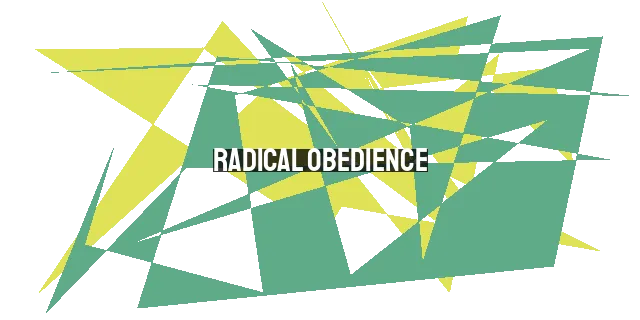Christian Hub
1 year ago
Embracing God's Providence: Motivating Action and Making a Difference
God's Providence: A Call to Action
Have you ever wondered about the providence of God? The idea that God reigns over all, ruling over every aspect of our lives, can be both awe-inspiring and overwhelming. It can ignite a holy ambition in some, while causing others to become complacent and passive. In this article, we will explore the concept of God's providence and how it should motivate us to action.
The Parable of the Talents
To understand the power of God's providence, let us turn to the Parable of the Talents in the Bible. In this story, a master entrusts his servants with talents (a form of currency) and goes away. Two of the servants invest and multiply their talents, while one hides his talent in the ground. When the master returns, he rewards the two servants who were diligent in multiplying their talents, but punishes the one who buried his talent.
This parable teaches us that God expects us to use the gifts and resources He has given us for His glory. It challenges us to take action and make the most of the opportunities presented to us. We are called to be productive and proactive, rather than passive and complacent.
The Dangers of Passivity
Unfortunately, some individuals use the concept of God's providence to excuse their passivity and lack of action. They wait for an "open door" or a clear sign from God before they take any steps forward. They believe that if God wants something to happen, He will make it happen without their involvement.
This kind of thinking is not only unbiblical but also irresponsible. It allows us to hide behind the notion of waiting for divine intervention, instead of actively pursuing the good works that God has prepared for us. It paralyzes us from taking risks, stepping out of our comfort zones, and making a difference in the world.
Examples from Scripture
Throughout the Bible, we find numerous examples of individuals who acted in response to God's providence. Their stories inspire and challenge us to do the same.
One such example is Jonathan, who, with only his armor-bearer by his side, attacked an entire army. He had faith in God's providence, believing that nothing could hinder the Lord from saving by many or by few (1 Samuel 14:6). Jonathan's courage and boldness demonstrate that even in the face of overwhelming odds, we can trust in God's sovereignty and take action.
Another inspiring example is Esther, who risked her life to approach the king and save her people. When faced with the possibility of death, she was reminded that perhaps she had come to the kingdom for such a time as this (Esther 4:14). Esther's story teaches us that God's providence often places us in specific situations for a purpose, and it is our responsibility to act accordingly.
David, the young shepherd boy who defeated the giant Goliath, is yet another example of someone who acted in response to God's providence. When Saul doubted David's ability to defeat Goliath, David confidently proclaimed that the Lord who delivered him from the paw of the lion and bear would also deliver him from the hand of the Philistine (1 Samuel 17:37). David's story encourages us to trust in God's past faithfulness and step forward in faith.
Acting the Providence of God
To fully embrace the concept of God's providence, we must understand that it is not just something to react to but also something to act upon. Yes, there are times when God opens doors and orchestrates events in unmistakable ways. However, there are also times when God expects us to take the initiative, to push doors open, and to actively pursue His will.
The apostle Paul captures this dynamic in Philippians 2:12–13 when he encourages believers to work out their own salvation with fear and trembling, for it is God who works in them to will and to act in order to fulfill His good purpose. Paul emphasizes that our effort is not separate from God's work but rather a simultaneous expression of it. We are called to actively participate in God's providence, knowing that He is working in and through us.
When faced with a task or an opportunity, we should not wait for a clear sign or a divine intervention. Instead, we should pray earnestly, seek God's guidance, and take action. We should trust that if it aligns with God's will, He will bless our efforts and make a way where there seems to be no way.
Imagining Good
Each one of us has been uniquely created and positioned by God's providence. Our talents, skills, and circumstances are not accidents but intentional placements by God. He has prepared good works for us to walk in (Ephesians 2:10), and it is our responsibility to discern and pursue them.
Rather than passively drifting under God's providence, we should actively engage our renewed minds, ignite our born-again imaginations, and envision the possibilities that lie before us. Every good resolve, every spark of inspiration, is a reflection of God's providence working in and through us.
Imagine the impact we can have when we fully embrace God's providence and take action. There are neighbors to befriend, children to disciple, churches to plant, crisis-pregnancy centers to serve, and countless tasks in our jobs that can be done with excellence and love. Instead of waiting for unmistakable signs, let us be proactive and seize the opportunities before us.
Conclusion
In conclusion, the providence of God is not meant to paralyze us in passivity but to propel us into action. We are called to be active participants in God's plan, not merely passive observers. The examples from Scripture remind us of the courage, faith, and boldness that come from trusting in God's providence.
Let us not wait for open doors but actively push them open. Let us envision the good that can come from our actions and trust that God is working in and through us. We are who we are, where we are, and have what we have because of the all-pervasive providence of God. Let us, therefore, act the providence of God and bring His kingdom to earth.
Have you ever wondered about the providence of God? The idea that God reigns over all, ruling over every aspect of our lives, can be both awe-inspiring and overwhelming. It can ignite a holy ambition in some, while causing others to become complacent and passive. In this article, we will explore the concept of God's providence and how it should motivate us to action.
The Parable of the Talents
To understand the power of God's providence, let us turn to the Parable of the Talents in the Bible. In this story, a master entrusts his servants with talents (a form of currency) and goes away. Two of the servants invest and multiply their talents, while one hides his talent in the ground. When the master returns, he rewards the two servants who were diligent in multiplying their talents, but punishes the one who buried his talent.
This parable teaches us that God expects us to use the gifts and resources He has given us for His glory. It challenges us to take action and make the most of the opportunities presented to us. We are called to be productive and proactive, rather than passive and complacent.
The Dangers of Passivity
Unfortunately, some individuals use the concept of God's providence to excuse their passivity and lack of action. They wait for an "open door" or a clear sign from God before they take any steps forward. They believe that if God wants something to happen, He will make it happen without their involvement.
This kind of thinking is not only unbiblical but also irresponsible. It allows us to hide behind the notion of waiting for divine intervention, instead of actively pursuing the good works that God has prepared for us. It paralyzes us from taking risks, stepping out of our comfort zones, and making a difference in the world.
Examples from Scripture
Throughout the Bible, we find numerous examples of individuals who acted in response to God's providence. Their stories inspire and challenge us to do the same.
One such example is Jonathan, who, with only his armor-bearer by his side, attacked an entire army. He had faith in God's providence, believing that nothing could hinder the Lord from saving by many or by few (1 Samuel 14:6). Jonathan's courage and boldness demonstrate that even in the face of overwhelming odds, we can trust in God's sovereignty and take action.
Another inspiring example is Esther, who risked her life to approach the king and save her people. When faced with the possibility of death, she was reminded that perhaps she had come to the kingdom for such a time as this (Esther 4:14). Esther's story teaches us that God's providence often places us in specific situations for a purpose, and it is our responsibility to act accordingly.
David, the young shepherd boy who defeated the giant Goliath, is yet another example of someone who acted in response to God's providence. When Saul doubted David's ability to defeat Goliath, David confidently proclaimed that the Lord who delivered him from the paw of the lion and bear would also deliver him from the hand of the Philistine (1 Samuel 17:37). David's story encourages us to trust in God's past faithfulness and step forward in faith.
Acting the Providence of God
To fully embrace the concept of God's providence, we must understand that it is not just something to react to but also something to act upon. Yes, there are times when God opens doors and orchestrates events in unmistakable ways. However, there are also times when God expects us to take the initiative, to push doors open, and to actively pursue His will.
The apostle Paul captures this dynamic in Philippians 2:12–13 when he encourages believers to work out their own salvation with fear and trembling, for it is God who works in them to will and to act in order to fulfill His good purpose. Paul emphasizes that our effort is not separate from God's work but rather a simultaneous expression of it. We are called to actively participate in God's providence, knowing that He is working in and through us.
When faced with a task or an opportunity, we should not wait for a clear sign or a divine intervention. Instead, we should pray earnestly, seek God's guidance, and take action. We should trust that if it aligns with God's will, He will bless our efforts and make a way where there seems to be no way.
Imagining Good
Each one of us has been uniquely created and positioned by God's providence. Our talents, skills, and circumstances are not accidents but intentional placements by God. He has prepared good works for us to walk in (Ephesians 2:10), and it is our responsibility to discern and pursue them.
Rather than passively drifting under God's providence, we should actively engage our renewed minds, ignite our born-again imaginations, and envision the possibilities that lie before us. Every good resolve, every spark of inspiration, is a reflection of God's providence working in and through us.
Imagine the impact we can have when we fully embrace God's providence and take action. There are neighbors to befriend, children to disciple, churches to plant, crisis-pregnancy centers to serve, and countless tasks in our jobs that can be done with excellence and love. Instead of waiting for unmistakable signs, let us be proactive and seize the opportunities before us.
Conclusion
In conclusion, the providence of God is not meant to paralyze us in passivity but to propel us into action. We are called to be active participants in God's plan, not merely passive observers. The examples from Scripture remind us of the courage, faith, and boldness that come from trusting in God's providence.
Let us not wait for open doors but actively push them open. Let us envision the good that can come from our actions and trust that God is working in and through us. We are who we are, where we are, and have what we have because of the all-pervasive providence of God. Let us, therefore, act the providence of God and bring His kingdom to earth.



POST COMMENT
For post a new comment. You need to login first. Login
COMMENTS(0)
No Comment yet. Be the first :)